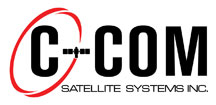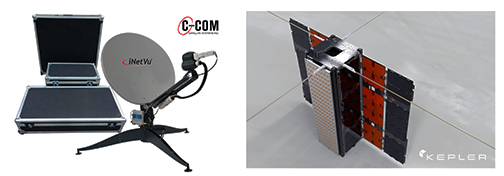

C-COM Satellite Systems Inc. (TSXV: CMI) has announced their first successful integration with LEO satellite tracking capabilities — the test was completed with the C-COM iNetVu® FLY-981 Ku-band antenna and with Kepler Communications’ first in orbit LEO satellites, KIPP and CASE.
Kepler is a pioneering smallsat telecommunications company based in Toronto, Canada. During the store and forward tests, C-COM's FLY-981 antenna successfully acquired signal to Kepler’s nanosats and achieved data transfer speeds of more than 100 Mbps downlink and 30M bps uplink.Shortly thereafter, the same data was downloaded to Kepler’s teleport in Inuvik, Canada.

This uniquely successful test completes a significant development project between the two companies. C-COM’s engineering team developed the necessary tracking algorithms to work with the iNetVu® 7000 series controllers and Kepler provided access to their LEO satellite constellation and assisted with daily testing.
The iNetVu® FLY-981 (photo to right) is C-COM's 98 cm., fully automatic and motorized Ku-band flyaway product. This antenna system is a highly portable terminal of choice for various industries such as Oil & Gas, Exploration, Emergency Response, Military Communications, Cellular Backhaul, Satellite News Gathering, and many other vertical markets.
C-COM offers classic and next generation Driveaway, Flyaway, Fixed Motorized, and Manpack systems (iNetVu®) for any vertical market where communications are challenged due to disruption or deficiency. C-COM has more than 20 different Comm-on-the-Pause (COTP) antenna models, integrated with all major modem manufacturers, approved with most major satellite operators, and is working closely with more than 500 active dealers in over 100 countries. More than 8,000 iNetVu® systems have been sold since the brand’s inception.
Working with a renowned research team at the University of Waterloo, the Company is also developing an electronically steerable, Comms-on-the-Move (COTM) Ka-band flat panel antenna system based on phased array technology with the potential to revolutionize satellite’s addressable mobile markets for land, airborne and maritime.
Leslie Klein, President and CEO of C-COM Satellite Systems Inc., said that for C-COM, this test with Kepler Communications LEO nano-satellites opens up new developing markets for the company's extensive worldwide reseller base. The store and forward data delivery services offered by Kepler’s LEO constellation using C-COM's iNetVu® mobile antenna system’s Low Earth Orbit option will provide customers with a unique, cost-effective large data transfer capability.
Mina Mitry, CEO of Kepler Communications, added that, for Kepler, the addition of the C-COM FLY-981 as an approved satellite antenna solution expands the potential user base beyond maritime applications, to land-based mobile/transportable applications such as natural resource exploration and extraction, remote research bases, disaster management, defense, and many other vertical markets requiring high-capacity connectivity where portability and reliability are key considerations.

